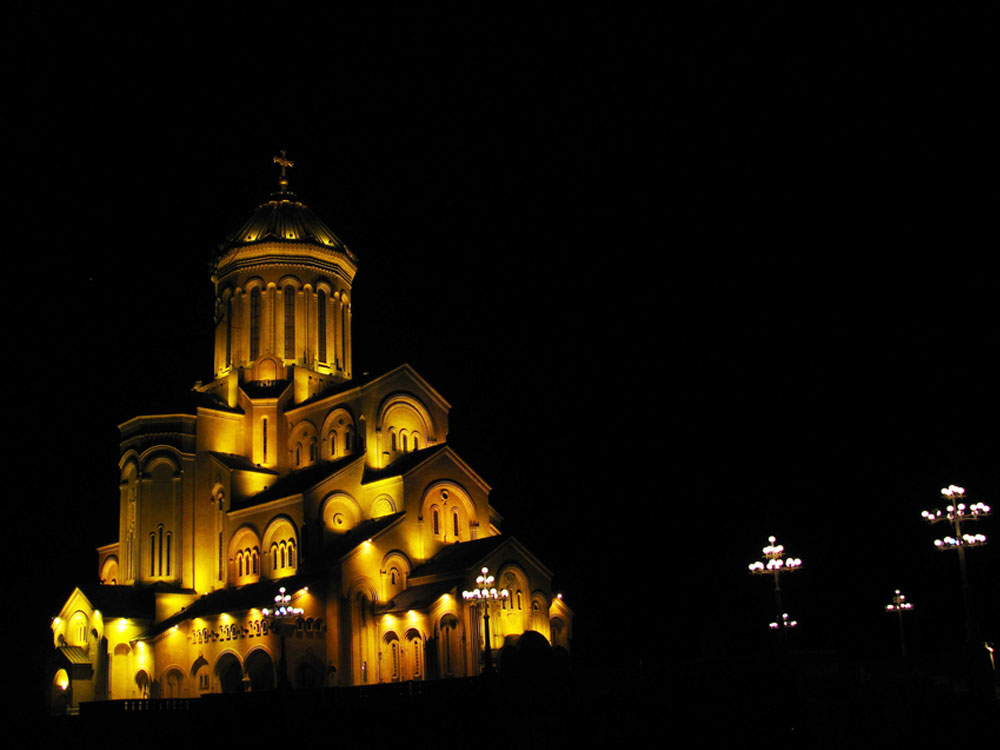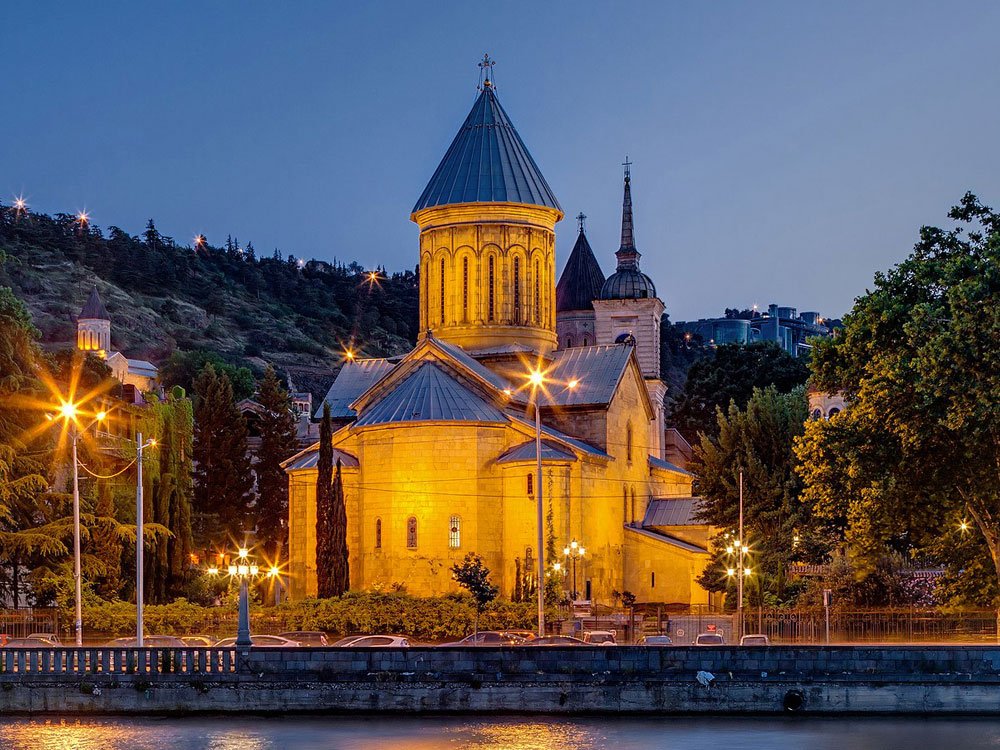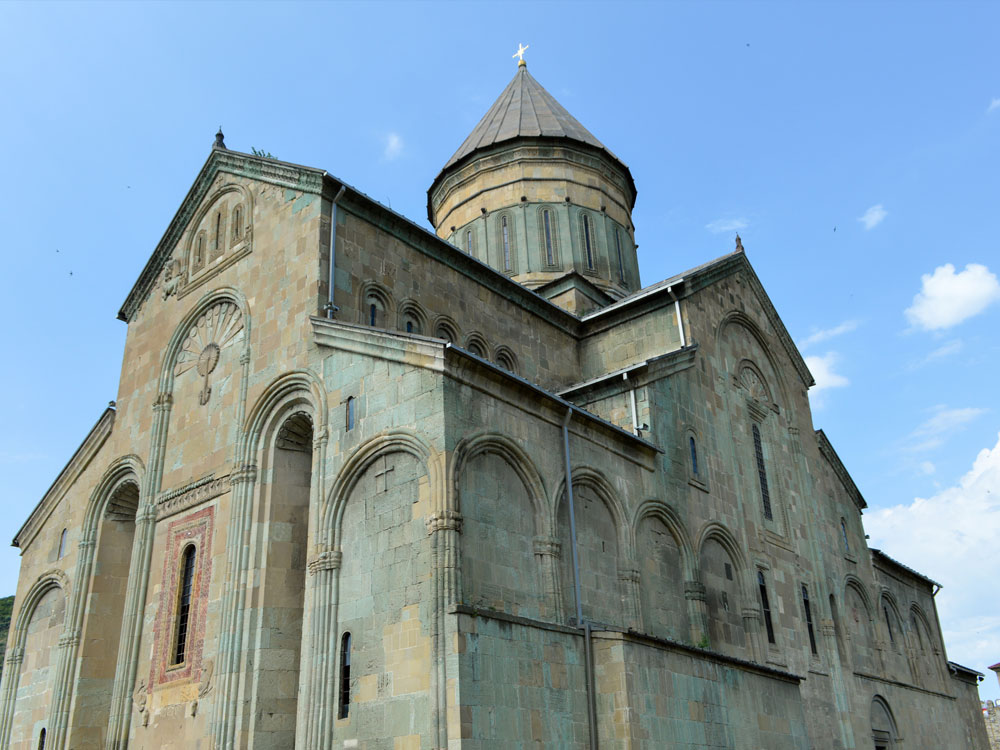CHURCHES & MONASTERIES IN GEORGIA

Although the vast majority of Georgians are Orthodox Christians, the country has a long tradition of harbouring communities and places of worship from different faiths. The capital Tbilisi is a perfect example. In addition to its many churches, it is served by two synagogues and three mosques, including the Jumah Mosque which provides sanctity for Sunni and Shia Muslims to pray side by side.
Georgian Orthodox Christianity is by far the country’s primary religion, and visiting Georgia’s churches and monasteries will shine a light on the power of the Church in terms of traditional practices and conservative politics. Christianity has been preached in Georgia since the 1st century, and it was declared the national religion some 300 years later. The Ottoman invasion in the early 18th century, followed by annexation by the Russian Empire and the Soviet Union, meant the Georgian Orthodox Church was repressed. Many churches were closed, destroyed or rebuilt as secular places of worship. However, since Georgia’s independence from Russia in the early 1990s the Georgian Orthodox Church has seen a continued rise and resurgence in numbers, and in power. It has become a virtual state religion.
Georgian Orthodox Christianity is by far the country’s primary religion, and visiting Georgia’s churches and monasteries will shine a light on the power of the Church in terms of traditional practices and conservative politics. Christianity has been preached in Georgia since the 1st century, and it was declared the national religion some 300 years later. The Ottoman invasion in the early 18th century, followed by annexation by the Russian Empire and the Soviet Union, meant the Georgian Orthodox Church was repressed. Many churches were closed, destroyed or rebuilt as secular places of worship. However, since Georgia’s independence from Russia in the early 1990s the Georgian Orthodox Church has seen a continued rise and resurgence in numbers, and in power. It has become a virtual state religion.
Armenia, Georgia and Azerbaijan highlights tour
Three stunning countries in one unforgettable tour
From
£1673 to £1771
13 days
ex flights
Georgia cultural vacation, Georgia Explorer
Trek amongst Georgia's untouched villages and mountains
From
US $3406
15 days
ex flights
Georgia tailor made tour
Independent tailor made vacations to Georgia
From
£1165 to £1247
9 days
ex flights
Georgia, Armenia and Azerbaijan small group tour
A comprehensive tour through Azerbaijan, Georgia and Armenia
From
£2999
20 days
ex flights
Short tour in Georgia, private departure
Short break in Georgia for time-limited travelers
From
£995
5 days
ex flights
Georgia small group tour
Medieval fortresses, ancient wine culture & charming locals
From
US $3245
12 days
ex flights

Starting in Tbilisi's Old Town, you can explore the 6th century Anchiskhati Basilica of St Mary and the Sioni Cathedral, on the banks of the river Kura. The elevated views from Metekhi Church are ideal for orientation as well as enlightenment.
Just 20km northwest of Tbilisi, the entire city of Mtskheta has UNESCO World Heritage status and is considered the country's primary center – a Holy City – of Georgian Orthodox Christianity. Its 11th century Svetitskhoveli Cathedral is Georgia’s second largest and is revered as it contains the tunic worn by Christ at the moment of crucifixion.
Heading towards the Russian border, the 14th century Holy Trinity Church of Gergeti gives hikers a heavenly place to head via a tough, yet rewarding, climb up the steep mountain slope. Another UNESCO site, the Vardzia Monastery, lies to the south of the capital – about a three-hour drive. Churches, chapels, cellars and monastic living quarters were carved from the Erusheti Mountains, close to the borders with Armenia and Turkey, and are still inhabited by monks who ring a bell every morning at 7am.
Our Georgia holidys always include opportunities to visit the churches and monasteries that have provided people with sanctity through imperial occupation and troubled times. Learning about the history of each building, and the surrounding communities, will allow travelers to understand the importance of religion to the people of Georgia, and how Georgian Orthodox Christianity is a huge part of the country's cultural heritage and national identity. You don't have to be in any way religious to experience the atmosphere of a grand city church or a rock hewn monastery. Visiting in the company of a local guide is definitely the best way to untangle the historic, cultural and political threads that are intertwined throughout the countries of the Caucasus.
Just 20km northwest of Tbilisi, the entire city of Mtskheta has UNESCO World Heritage status and is considered the country's primary center – a Holy City – of Georgian Orthodox Christianity. Its 11th century Svetitskhoveli Cathedral is Georgia’s second largest and is revered as it contains the tunic worn by Christ at the moment of crucifixion.
Heading towards the Russian border, the 14th century Holy Trinity Church of Gergeti gives hikers a heavenly place to head via a tough, yet rewarding, climb up the steep mountain slope. Another UNESCO site, the Vardzia Monastery, lies to the south of the capital – about a three-hour drive. Churches, chapels, cellars and monastic living quarters were carved from the Erusheti Mountains, close to the borders with Armenia and Turkey, and are still inhabited by monks who ring a bell every morning at 7am.
Our Georgia holidys always include opportunities to visit the churches and monasteries that have provided people with sanctity through imperial occupation and troubled times. Learning about the history of each building, and the surrounding communities, will allow travelers to understand the importance of religion to the people of Georgia, and how Georgian Orthodox Christianity is a huge part of the country's cultural heritage and national identity. You don't have to be in any way religious to experience the atmosphere of a grand city church or a rock hewn monastery. Visiting in the company of a local guide is definitely the best way to untangle the historic, cultural and political threads that are intertwined throughout the countries of the Caucasus.
Our top trip
Armenia, Georgia and Azerbaijan highlights tour
Three stunning countries in one unforgettable tour
From
£1673 to £1771
13 days
ex flights
Small group travel:
2024: 14 Apr, 28 Apr, 12 May, 26 May, 2 Jun, 9 Jun, 11 Aug, 25 Aug, 1 Sep, 8 Sep, 22 Sep, 6 Oct
2024: 14 Apr, 28 Apr, 12 May, 26 May, 2 Jun, 9 Jun, 11 Aug, 25 Aug, 1 Sep, 8 Sep, 22 Sep, 6 Oct
Travel Team
If you'd like to chat about Georgia or need help finding a vacation to suit you we're very happy to help.
1-866-821-6866
Call toll free
Calling from outside the USA
Respect and the Georgian church
When visiting Georgian Orthodox churches, men and women should cover their arms and legs, avoiding shorts, short skirts and short sleeves. Women will be required to cover their heads, while men should remove their hats. Quiet and peaceful meditation is requested on entering and departing churches in Georgia. Traditional Sunday services usually take place at 9am, while Saturday services are in the afternoon, usually around 4pm. Visitors are advised to observe quietly and act as they would in any other place of worship. No eating, drinking or unholy laughter.Jim O’Brien, from our supplier of vacations in Georgia, Native Eye:
“Georgians take religion a lot more seriously than many other European countries and their Georgian Orthodox church services are very involved and often quite lively.”
The LGBT community, unfortunately, is not tolerated by the Georgian Church. Outward displays of affection, by all sexual orientations, especially in or close to churches, is considered deeply disrespectful. Steering clear of political, religious and LGBT subject matter is recommended; jokes about Jesus will not be tolerated and may put your tour guide, accommodation hosts and other travelers, in an extremely awkward position. Please travel safely and peacefully no matter your political or religious beliefs.
RECOMMENDED CHURCHES & MONASTERIES IN GEORGIA

Svetitskhoveli Cathedral
Located in the Holy City of Mtskheta, Svetitskhoveli Cathedral is the second largest in Georgia and listed as a UNESCO World Heritage Site. Iconography and frescoes remain despite Soviet whitewashing, and the mantle of Jesus is why many make the pilgrimage.
Located in the Holy City of Mtskheta, Svetitskhoveli Cathedral is the second largest in Georgia and listed as a UNESCO World Heritage Site. Iconography and frescoes remain despite Soviet whitewashing, and the mantle of Jesus is why many make the pilgrimage.
Tbilisi Holy Trinity Cathedral
Georgia’s largest church is testament to the power of Georgian Orthodox Christianity and no trip to Tbilisi is complete without paying your respects here. The height is staggering, and provides an ever present landmark as well as a modern place of worship.
Georgia’s largest church is testament to the power of Georgian Orthodox Christianity and no trip to Tbilisi is complete without paying your respects here. The height is staggering, and provides an ever present landmark as well as a modern place of worship.
Jvari Monastery
Situated close to Mtskheta, Jvari Monastery was built in the 4th century to hold a lofty vantage point over the town and converging rivers. The setting provides pause for thought as well as evidence of architectural erosion due to a lack of protection from the elements.
Situated close to Mtskheta, Jvari Monastery was built in the 4th century to hold a lofty vantage point over the town and converging rivers. The setting provides pause for thought as well as evidence of architectural erosion due to a lack of protection from the elements.
Gergeti Trinity Church
An amazing location, under the shadow of Mount Kazbegi, makes Gergeti Trinity Church a must for hikers hoping for heaven after a four-hour round trek from the Caucasus town of Kazbegi. Keep an eye out for snowy peaks, and an ear open for the howl of wolves at night.
An amazing location, under the shadow of Mount Kazbegi, makes Gergeti Trinity Church a must for hikers hoping for heaven after a four-hour round trek from the Caucasus town of Kazbegi. Keep an eye out for snowy peaks, and an ear open for the howl of wolves at night.
HOW TO SEE GEORGIA’S CHURCHES & MONASTERIES
A small group tour of Georgia is the best way to discover the country’s places of worship. Local guides will explain the importance of the Georgian Orthodox Church and the power it wields today. Hearing about the traditions and cultural heritage from someone who has lived in the country all their life is wonderfully enlightening. It also pains a clearer picture of Georgia’s relationship with neighbouring countries Armenia and Azerbaijan.
Small group vacations are also brilliant for solo travelers as they can explore with more confidence and make new friends along the way. Extensions into Armenia and Azerbaijan can also be included in a two week vacation to help you to piece together the history and the culture of the Caucasus, in its entirety.
Small group vacations are also brilliant for solo travelers as they can explore with more confidence and make new friends along the way. Extensions into Armenia and Azerbaijan can also be included in a two week vacation to help you to piece together the history and the culture of the Caucasus, in its entirety.

























